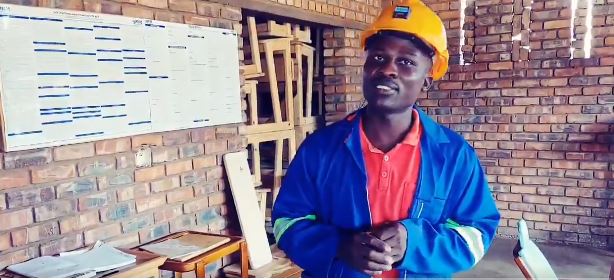Johannesburg – The Limpuma Furniture Co-operative situated in Tshitavha village in Nzhelele, Limpopo, is proving to be a successful venture for the community.
Started by nine young people from various villages, the cooperative currently employs 13 locals.
Chairperson of the co-operative, Mpho Neluheni, told SAnews that Limpuma was registered in 2015 and it has a branch in Mpumalanga.
Neluheni said with the skills they have acquired with the assistance of state-owned enterprise the South African Forestry Company Limited (SAFCOL), the co-operative is able to manufacture various types of furniture and sell them to the public.
“We sell our items to the public which includes local stores, churches and schools,” Neluheni told SAnews on a recent visit.
During the visit, SAnews observed how various items were being manufactured at the plant which includes coffee tables, kitchen units, podiums, benches and school desks, among other things.
The co-operative also generates money by repairing the community’s furniture.
[Watch] Economic Reconstruction and Recovery Plan (ERRP) project, Limpuma Furniture Co-operative in Limpopo #ERRP pic.twitter.com/mbrTYtKXSa
— South African Government (@GovernmentZA) April 8, 2021
“Every month-end we go to our nearest town to sell our products and we are currently negotiating with the various stores to get them to sell our products. We are also planning to open stores to make it easy for the public to get our products,” Neluheni said.
The chairperson also spoke about how COVID-19 has affected the cooperation’s operations, including that the level of production dropped.
“Despite all the challenges, we were able to survive, we were able to produce few products to keep us going,” Neluheni said.
Ambani Ndou an intern, spoke of how he is now able to operate most of the machinery at the plant.
“Now I am able to make various different pieces of furniture. After completing my internship here, I am planning to open my own workshop,” he said.
Young people form part of the furniture making learnership offered by SAFCOL’s Learning and Development division.
Limpuma secured a contract from the SAFCOL to manufacture school desks that were subsequently donated to rural based schools.
SAFCOL representative Helen Seloane said the company assisted the co-operative to acquire technical and business skills.
Watch:SAFCOL representative talking about Limpuma Furniture Co-operative #ERRP pic.twitter.com/4q5mOIabEv
— @SAgovnews (@SAgovnews) April 7, 2021
“We have offered them the necessary support they needed so they can be able to run the business efficiently,” Seloane said.
The co-operative has since completed its training with SAFCOL successfully.
The cooperative has continued to manufacture furniture and has managed to increase their product base by moving from manufacturing school desks to incorporating built-in cardboards, wooden trays, and pulpits among others.
It has also secured markets (retail outlets and local undertakers) and expanded their business by constructing a new workshop.
Meanwhile, the Department of Social Development (Integrated Community Development Support Services) awarded the co-operative a R500 000 grant that management invested in the expansion of the business by building a new operational workshop.
The business now has two workshops that will be used to manufacture furniture and be used for storing and dispatching completed products.
Furniture Industry Masterplan
Limpuma Furniture is one of the businesses set to benefit from the Furniture Industry Masterplan established to set clear guidelines and targets for the furniture manufacturing industry as well as guide public sector procurement as part of government’s efforts to support and stimulate the industry.
Earlier last month, Trade, Industry and Competition Deputy Minister, Nomalungelo Gina, said the masterplan has the potential to reposition the country in the sector.
Gina made the remarks while delivering a keynote address at the Buy Local Summit and Exhibition.
“It is one of the most labour intensive industries, with a potential to contribute to the reduction of unemployment, and increase the export and development of small, medium and micro enterprises (SMMES). It contributes to the geographical spread of economic activity, since the products can be developed in rural areas with minimal investment,” Gina said at the time.
The Furniture Industry Masterplan is centred on three-pillars which range from Market Access, Transformation and Improvement of Competitiveness.
Watch:Inside Limpuma Furniture Co-operative in Limpopo #ERRP pic.twitter.com/OkCWe4EFr4
— @SAgovnews (@SAgovnews) April 7, 2021
Some of the target objectives set for the furniture industry include the building of fast-growing, profitable, inclusive and sustainable South African furniture industry.
The plan is also aimed at increasing local production by 50% from the current baseline levels by the end of 2021.
Supporting local production
Apart from the Furniture Industry Masterplan, Limpuma will also play a role or contribute in the Economic Reconstruction and Recovery Plan (ERRP).
Key to this plan is a renewed commitment from government, business and organised labour to buy local which will lead to increased local production, which will lead to the revival of the manufacturing industry.
In turn, all social partners who participated in the development of the plan, as part of a social compact have agreed to work together to reduce the reliance on imports by 20% over the next five years.
A total 42 products – ranging from edible oils to furniture, fruit concentrates, personal protective equipment and steel products – have been identified as those than can be sourced locally.
– SAnews.gov.za
Follow @SundayWorldZA on Twitter and @sundayworldza on Instagram, or like our Facebook Page, Sunday World, by clicking here for the latest breaking news in South Africa. To Subscribe to Sunday World, click here.
Sunday World



